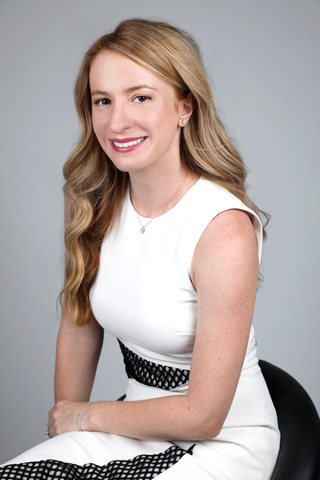How finance alumna Rachel Decker got on a Forbes list.

In late 2021, Rachel Decker (BBA12) was named to the Forbes Middle East 30 Under 30 list. She is managing partner and co-founder of the financial advisory firm Decker & Halabi in Dubai. Her boutique company focuses on corporate finance advising, including debt advising and M&A, and competes with global investment banks. She has run more than $4 billion worth of deals since commencing her career in finance.
Just how did this young, female leader in finance get there? We called Decker on holiday in Rabat, Morocco to break it down.
Graduate from Tippie
Decker transferred to Tippie after one semester at the University of Georgia, Athens. She came in knowing what she wanted. She immediately declared a finance major with an Arabic minor. “I tell everyone I got the best education in finance from the University of Iowa. I think they do an excellent job in terms of variety of courses, academic advisors, preparation, and resources.”
Don’t be afraid to move
Her father’s career with Rockwell Automation transplanted the family from Wisconsin to Indiana to North Carolina to Iowa in the space of only a few years, setting a precedent for big moves. “Whenever my parents say they miss me and need me to come back, I say ‘What? You got me started on this!’”
When she later accepted a position at Standard Chartered Bank in Dubai at the age of 23, she had never been there. She just arrived with her suitcases.
Go global
Decker first studied abroad in Morocco as a Tippie student. She loved it so much that she spent many subsequent breaks back in the north African country, all while graduating early, interning in London with Taylor Rafferty LLC, and waitressing for traveling money. By the end of her trips, where she often took intensive language courses, she was fluent in Arabic and had met her fiancé, Driss. The two now live together in Dubai and are getting married in Chicago in July 2022.
Call on your mentors
“Mentors are very important to have. They’ve really helped me and still help me all the time.”
Decker’s mentors have helped shape her trajectory—from choosing Arabic as a marketable foreign language, to planning her early career moves in investment banking.
Decker started her career with BMO, getting hired after completing their ultracompetitive analyst development program, which she recalls as “fantastic,” and “better than an MBA.” It was with BMO that she was exposed to the debt, capital markets, and project finance aspects of the real estate space. While she liked her group, she hated the cold winters of Chicago and wasn’t using Arabic.
“My mentors encouraged me to seek out an international bank, so I started applying through LinkedIn.”
It worked.
She packed her bags for Dubai and spent a year in leveraged finance at the UK-based Standard Chartered Bank and two years at the largest private bank in the region, Mashreq Bank.
Take risks
After five years in investment banking, she launched her own company, Decker & Halabi with partner Abdul wahab Al-Halabi, who was an Emirati client she impressed on a complicated deal she structured while at Mashreq. She was ready for a big change and she made it happen.
“I was feeling stagnant and bored in terms of growth in investment banking. I learned the skillsets, which were super valuable, but I wanted to start thinking more creatively and doing things apart from ‘plain vanilla’ term loans. I just needed a partner with a network to get me in the door. I was also at a place in my twenties with little in terms of financial obligations. If you’re going to take a risk and quit, I thought, now is the time. Fortunately, every year I’ve made more money than the year before.”

Call your mom
Decker’s day-to-day has her waking up at 8:00 a.m., having a coffee while chatting on the phone with her mom, working for an hour, taking a yoga class or going for a run, and then working at her desk or in meetings from 11 a.m. until 9-10 p.m., or later if she has a business dinner. She estimates she works around 70 hours a week.
“I make time for things that are important.”
Prioritize self-care
“I imagine when people see me running on the street in Dubai at ten in the morning when its 110 degrees, they think ‘You need to get your head examined—that's not normal.’ But it's a good stress reliever. Working out is essential for my mental well being.”
Have the entrepreneurial spirit
“Dubai is different from the U.S.—it’s sort of like the wild west. If you’re smart and you work hard, I think that there are a lot of opportunities to make moves in finance.
"Even as a ‘no-name’ startup, I am competing with—and beating out—global investment banks. It’s a plus that the region has to offer.”
Work hard & Think outside the box
“You never get hired after one dinner. I spend weeks sitting with clients, going through data, and listening to their problems. I work hard to come up with ‘outside the box’ structures and do a lot of work for free up front, while the large international banks have more of a one size-fits-all approach.”
Ditch the ladder
“At banks, there are so many layers of bureaucracy. It’s very slow to move up the ladder. You don't even get to go to meetings! Now I'm working directly with principals. Some of my clients are selfmade billionaires and I learn about their business, and we debate. Even in the Middle East, I have 60-year-old men from the U.A.E., India, and all sorts of countries that hire me, sit at the table, and listen to my advice.”

Don’t be intimidated
“There are actually some advantages to being a woman in finance. One example is that I think men feel comfortable talking to women. They don’t feel so threatened or judged. You can get them to drop their ego and you can have a nice rapport.”
Be likeable
Decker’s congeniality comes through in an instant, even over Zoom. She’s smiley, friendly, and very easy to talk to, which surely helped her set up her partnership as well as land clients.
“Soft skills are actually really important. When you’re dealing with family businesses and mid-corporates, it’s about the relationship. I think it helps to be a little likable and funny from time to time. Of course, it’s about the combination of
personality and capability.”
“With my partner, it was an easy sell to start the firm. We hit it off. We were friends, which, I think is very important in professional partnerships. You have to actually like the other person because when you’re working on these types of
transactions, it can be 24/7.”
Collaborate
“It's good to have a partnership. I wouldn't want to work by myself because there’s a lot of value in brainstorming and coming up with ideas. I'm a big proponent of collaboration because it is really about teamwork to get these deals done.”
Deliver
“The most important thing from my perspective is that my client is happy when we're done with the work.”
This article originally appeared in the 2022 issue of Exchange magazine.
